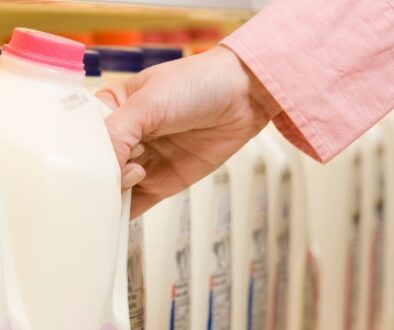Dairy Seeks Representation In Sustainability-Focused Trade
The International Dairy Foods Association (IDFA) recently issued the U.S. Dairy Trade Principles on Environmental Sustainability, which the association says is a “critical and proactive step” as the global community rallies around climate change and initiatives begin to impact international trade.
On Tuesday, IDFA sent letters urging the Office of the U.S. Trade Representative (USTR) and USDA to use these trade principles to ensure the U.S. dairy industry is represented in the Biden administration’s sustainability-focused trade agenda.
U.S. Trade Representative Katherine Tai testified Wednesday before the Senate Finance Committee on President Biden’s 2021 trade policy agenda, stressing a focus on individual workers, racial equity and environmental protection. She also emphasized USTR’s commitment to working with specific partners, including the European Union and the United Kingdom, to resolve the ongoing Boeing-Airbus dispute, and holding Canada and Mexico accountable to trade, labor and environmental standards set in the U.S.-Mexico-Canada Agreement (USMCA).
“Our farmers, ranchers, fishers and food processors will benefit from our new approach, and they are essential to meeting our climate and sustainability goals,” Tai says. “We are turning the page on erratic trade policies. USTR’s goal is to pursue smarter policies that expand global market opportunities while enforcing global trade standards and ensuring that trading partners live up to their commitments.”
In its letters to USTR and USDA, IDFA notes its members already are making significant progress toward achieving measurable, science-based environmental sustainability outcomes that benefit consumers and the planet. These principles support that progress and the industry’s trade interests by establishing a set of obligations for U.S. trading partners. IDFA adds this policy blueprint urges alignment of the environmental sustainability requirements with existing World Trade Organization (WTO) obligations and that they follow the most advanced science and promote innovation.
“President Biden and Ambassador Tai have made it clear in their agendas published to date that sustainability is and will increasingly be an area of policy focus, particularly in the context of trade. Since it is uncommon for experts in our industry to be specialized in both trade and sustainability, we wanted to proactively help connect those two sides of our industry for our government colleagues,” says Becky Rasdall, IDFA vice president, trade policy and international affairs. “We recognized an immediate need to put the industry’s strong efforts on sustainability into the language of our government’s trade negotiators and have worked with our members to develop these 13 principles. We believe they will position our negotiators for success by prioritizing the kinds of trade policies that will build upon U.S. dairy’s existing sustainability initiatives.”
IDFA’s U.S. Dairy Trade Principles on Environmental Sustainability include:
• Review prior to regulating
• No prohibition of goods
• Measures based on actual performance
• Non-discriminatory, non-trade restrictive measures
• Limitations on taxation and tariffs
• Voluntary measures related to consumer information
• Use of international standards and metrics
• Outcome-based, not prescribed
• Science and risk-based
• Ensure continued innovation
• Take regional conditions into account
• Sectoral appropriateness and flexibilities
• Promulgation through good regulatory practices.
To view the full descriptions of IDFA’s U.S. Dairy Trade Principles on Environmental Sustainability as well as its letters to USTR and USDA, visit www.idfa.org/wordpress/wp-content/uploads/2021/05/IDFA-Trade-Sustainability-Principles-and-Letters-to-Secretary-Vilsack-and-Ambassador-Tai.pdf.
Last week, representatives from the National Milk Producers Federation (NMPF) met with Tai to discuss expanding access overseas for U.S. dairy products and eliminating non-tariff trade barriers (see “NMPF meets with trade representative on expanding U.S. agricultural exports, markets” in last week’s issue of Cheese Market News). In a follow-up to that meeting, NMPF President and CEO Jim Mulhern and U.S. Dairy Export Council (USDEC) President and CEO Krysta Harden highlighted the dairy industry’s work on sustainability — including the Net Zero Initiative to reach carbon neutrality or better by 2050 and the National Dairy FARM Program that promotes socially responsible, sustainable production — and how trade policy can help supply more sustainably produced products to the world.
Nicole Ayache, senior director for sustainability initiatives, NMPF, notes that U.S. dairy farmers have made great progress. For example, the environmental impact of producing a gallon of milk in 2017 required 30% less water, 21% less land and 19% smaller carbon footprint than it did in 2007.
“U.S. dairy’s current success and 2050 goals are increasingly important in the international arena as more than 15% of our milk production is now exported,” she says. “U.S. dairy products must not only compete on price, safety and nutrition, but increasingly on sustainability. Our global competitors in Europe and Oceania have embarked on their own sustainability journeys and are using sustainability as a marketing differentiation.”
NMPF Senior Vice President for Trade Policy Shawna Morris notes that beyond commercial space, sustainability issues are cropping up more frequently in multilateral organizations such as this September’s United Nations (UN) Food Systems Summit, which has been billed as an effort to “radically reform” the way the world farms, consumes and produces food.
“NMPF’s working closely with USDEC and DMI (Dairy Management Inc.) to tell dairy’s story and advocate for dairy farmer interests in the summit through numerous channels, including directly with a strong focus on our FARM program and the industry’s Net Zero Initiative, and through robust outreach to the U.S. government to urge them to play a leading role in advocating for positive results in this international undertaking,” Morris says, adding that in March NMPF outlined to USDA and the State Department a core set of principles that should guide results the U.S. government seeks to achieve on sustainable food systems in this context.
USDEC also notes it is directly engaged with the summit and is working closely with the U.S. government to raise awareness of its sustainability priorities and the negative impact that non-scientific, agenda-driven UN recommendations could have on U.S. dairy farmers and processors.
“As more countries look to the UN for guidance on reducing environmental impact, particularly developing markets key to U.S. dairy exports, we anticipate the proliferation of policies that threaten to negatively impact dairy trade and consumption,” USDEC says. “While U.S. dairy has and will continue to improve its sustainability profile, it is critical that USDEC be at the table in these global discussions to show, on the one hand, that U.S. dairy is recognized for its sustainable practices, progress and leadership. And, on the other hand, to fight back against extreme recommendations not based on science, but on anti-animal protein agendas.”
Keep Up To Date On Cheese Industry News
Find all of HART Design & Manufacturing current industry news here.
Source: Cheese Market News




